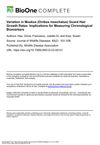 1 citations,
February 2021 in “Animal feed science and technology”
1 citations,
February 2021 in “Animal feed science and technology” Organic selenium may offer better retention and less waste in puppies.
 1 citations,
June 2010 in “Expert Review of Dermatology”
1 citations,
June 2010 in “Expert Review of Dermatology” Covers common skin issues in kids, their diagnosis, treatment, and need for specialist care.
 October 2024 in “Frontiers in Oncology”
October 2024 in “Frontiers in Oncology” Keratin 18 helps diagnose and predict cancer progression and affects cancer growth and spread.
 April 2024 in “Journal of wildlife diseases”
April 2024 in “Journal of wildlife diseases” Muskox hair growth rates vary widely, so a single growth rate can't be used for all populations.
 April 2024 in “International journal of women's health”
April 2024 in “International journal of women's health” Adult female acne is a complex condition that can worsen with menopause, requiring holistic treatment and tailored skincare at different life stages.

The article suggests that patients with Frontal Fibrosing Alopecia may have more contact allergies, but it doesn't prove that allergies cause the condition.
 January 2024 in “International Journal of Dermatology Venereology and Leprosy Sciences”
January 2024 in “International Journal of Dermatology Venereology and Leprosy Sciences” Patients with acne vulgaris have lower serum irisin levels.
 May 2023 in “Animal Reproduction Update”
May 2023 in “Animal Reproduction Update” High levels of cortisol in hair show long-term stress which can lower fertility in animals.

Inhibiting AP-1 changes skin tumor types and affects tumor cell identity.

Inhibiting AP-1 changes skin tumor types and affects tumor cell identity.

Wild African goats have genetic adaptations for surviving harsh desert conditions.
 March 2021 in “Actas Dermo-Sifiliográficas”
March 2021 in “Actas Dermo-Sifiliográficas” The microbiome may be linked to hair loss and could be a target for new treatments.
 November 2020 in “Elsevier eBooks”
November 2020 in “Elsevier eBooks” Antiandrogens and androgen inhibitors like spironolactone, finasteride, and dutasteride can treat hair loss and skin conditions, but they have risks and side effects, including potential harm to pregnant women and risks of cancer and heart issues. Herbal remedies also have antiandrogenic effects but lack safety validation.
 January 2020 in “Der Pharmacia Lettre”
January 2020 in “Der Pharmacia Lettre” Nanoparticle-based herbal remedies could be promising for treating hair loss with fewer side effects and lower cost, but more research is needed.
 January 2019 in “ISGE series”
January 2019 in “ISGE series” The document concludes that effectively managing PCOS requires a multifaceted approach.
 November 2016 in “Zoo biology”
November 2016 in “Zoo biology” Adding more vegetables and fruits improved capybaras' coat quality and health.
 January 2009 in “Elsevier eBooks”
January 2009 in “Elsevier eBooks” Some plant-based treatments may help with ovary function, insulin resistance, and excess male hormones in PCOS, but more research is needed to confirm their safety and effectiveness.
 January 2009 in “Springer eBooks”
January 2009 in “Springer eBooks” The document concludes that treating skin conditions should include psychological care and a multidisciplinary approach is essential for effective management.
 January 2021 in “Journal of cosmetology & trichology”
January 2021 in “Journal of cosmetology & trichology” The treatment improved hair growth and thickness in patients with hair loss, even 10 months after therapy without additional products.
 1533 citations,
October 2008 in “Endocrine reviews”
1533 citations,
October 2008 in “Endocrine reviews” Mice without the vitamin D receptor have bone issues and other health problems, suggesting vitamin D is important for preventing various diseases in humans.
 926 citations,
June 2010 in “BMC Medicine”
926 citations,
June 2010 in “BMC Medicine” Polycystic ovary syndrome is a complex condition that affects women's mental, reproductive, and metabolic health throughout their lives.
 883 citations,
August 2016 in “Nature Reviews Disease Primers”
883 citations,
August 2016 in “Nature Reviews Disease Primers” Polycystic Ovary Syndrome (PCOS) is a common condition in women that can cause metabolic, reproductive, and psychological issues, and requires lifestyle changes and medication for management.
 521 citations,
January 1954 in “Physiological Reviews”
521 citations,
January 1954 in “Physiological Reviews” Hair growth is cyclic and influenced mainly by local factors.
 369 citations,
June 2013 in “Biochimie”
369 citations,
June 2013 in “Biochimie” Myo-inositol supplements may improve insulin sensitivity and help with conditions like PCOS and gestational diabetes, but more research is needed.
 356 citations,
September 2014 in “Journal of Clinical Research in Pediatric Endocrinology”
356 citations,
September 2014 in “Journal of Clinical Research in Pediatric Endocrinology” Childhood obesity is rising globally due to various factors, and early prevention and healthy lifestyle changes are crucial.
 271 citations,
September 2008 in “Nutrition reviews”
271 citations,
September 2008 in “Nutrition reviews” Vitamin D receptor interacts with certain dietary components to help prevent diseases and regulate hair growth.
 240 citations,
February 2005 in “Diabetes Care”
240 citations,
February 2005 in “Diabetes Care” Patients need long-term care after bariatric surgery to manage potential nutritional and metabolic issues.
 234 citations,
December 1996 in “Journal of The American Academy of Dermatology”
234 citations,
December 1996 in “Journal of The American Academy of Dermatology” Middle-aged women with chronic telogen effluvium experience increased hair shedding but usually don't get significantly thinner hair.
 222 citations,
January 2014 in “International journal of reproductive medicine”
222 citations,
January 2014 in “International journal of reproductive medicine” Insulin resistance and obesity are key factors in the development and worsening of polycystic ovary syndrome, and lifestyle changes are important for managing it.
 214 citations,
March 1993 in “Archives of Dermatology”
214 citations,
March 1993 in “Archives of Dermatology” Telogen effluvium is a reversible hair loss condition that requires a detailed diagnosis and often resolves on its own.






























